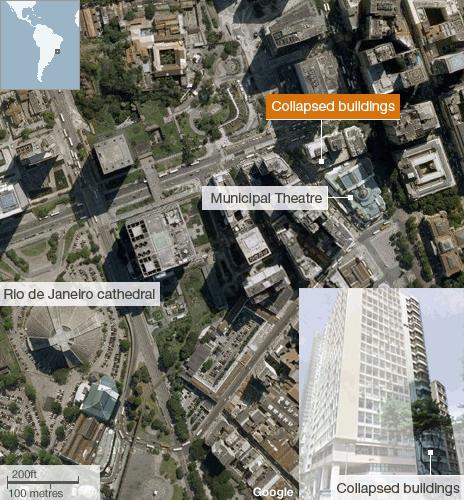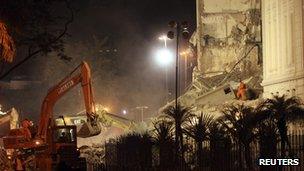Rio de Janeiro building collapse rescue continues
- Published
Aerial shots of the destroyed buildings
At least 19 people are believed to be missing after two high-rise buildings collapsed in Rio de Janeiro late on Wednesday.
Rescue workers are searching through the rubble for survivors. Five people are said to have been lightly injured.
Rescuers freed a cleaner from inside a buried lift after he managed to call a friend on his mobile phone.
City Mayor Eduardo Paes said current investigations were pointing towards structural problems.
He discounted speculation that a gas explosion could have caused the collapse.
The mayor told Globo News television that "19 people who were inside the buildings have not returned home".
The buildings, which were respectively 10 and 20 storeys high and were located near the Municipal Theatre and the headquarters of oil giant Petrobras, crushed a four-storey construction site on their way down.

Dozens of emergency workers attended the scene and police cordoned off the area.
Electricity to the street has been cut off for safety reasons.
One witness, who identified himself as Gilbert, told Reuters news agency: "It was like an earthquake. First some pieces of the buildings started to fall down. People started to run. And then it all fell down at once."
Allesandro da Silva Fonseca told AFP he had been briefly trapped in a lift with five construction workers after they tried to escape. He said he had almost suffocated because of the dust.
"I was out of air. I could not breathe," he said.

At least five people are believed to have been rescued from the rubble
Hugh Oliver, who was in the area when the collapse happened, told the BBC the situation was surreal.
"The city quickly filled with rescue vehicles and there was a lot of helicopter activity. The dust cloud hung around for a long time.
"The weird thing was the surreal attitude of the population. People were mainly unaffected - the city continued as normal."
The incident comes a little over three months after a suspected gas explosion at a restaurant in the city left three people dead.
Concerns have been raised about the state of Rio de Janeiro's infrastructure as Brazil prepares to host football's World Cup in 2014 and the Olympic Games two years later.
Mr Oliver added: "The infrastructure is poor - only areas such as Barra de Tijuca are modern and well regulated, but behind the main streets in the centre of Rio there are crumbling dirty side streets where safety is not the top priority."
- Published13 October 2011
- Published26 January 2012